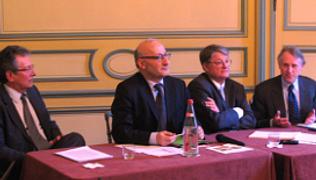
A seminar was held on Thursday, February 4, 2010 in Paris (Maison de l'Amérique Latine), bringing together about forty French and foreign experts, and senior officials of the French Civil Service on the question of the European development aid policy. Minutes of the seminar
The debates, animated by Patrick Guillaumont and Jacques Levard, particularly relied on the speeches of Georges Serre, Deputy Director General of the Directorate General for globalization, development and partnership of the Ministry of Foreign and European Affairs, Jean-Michel Debrat, Deputy Director General of the French Development Agency, Serge Degallaix, former French Ambassador to Tunisia, Philippe Etienne, Ambassador, Permanent Representative of France to the European Union in Brussels and Bernard Petit, Former Deputy Director General of the Directorate General for Development and Relations with African, Caribbean and Pacific States of the European Commission.
The debates also benefited from speeches of eminent European experts such as Arne Bigsten (Gothenburg University), Jorge Braga de Macedo (University of Lisbon and IITC), Lino Briguglio (University of Malta), Jean-Claude Casanova (National Foundation of Political Sciences), Jean-Claude Berthelemy (University Paris I), Philippe Hugon (University Paris X), Sylviane Guillaumont-Jeanneney (CERDI, University of Auvergne), Jan Willem Gunning (Free University of Amsterdam), Patrick Plane (CERDI, University of Auvergne), Christian Morrisson (University Paris I), Laurence Tubiana (Iddri).
The existence of a new European Parliament and a new European Commission invites to wonder about what should be the European development aid policy. Moreover, the current crisis entails the risk of Europe's self-withdrawal and of decrease of the member countries’ contributions to Community aid.
The Ferdi wished to contribute to the reflection on this area. Indeed, the Ferdi, an independent foundation, aims at clarifying the choices of public and private decision-makers through debate and confrontation of ideas.
Three major questions appeared to be discussed:
1 – Why European aid? How can it be justified alongside other multilateral aid and the bilateral European aid that already exists? Does it have specific objectives? Do these stem from a doctrine on Europe’s role in globalisation?
2 – Towards what countries should European aid be directed as a priority and to what geopolitical model does the European Union subscribe?
3 – What modalities need to govern European aid to make sure it meets its objectives and geographical priorities, and at the same time remains effective?
1 – Why European aid? How can it be justified alongside other multilateral aid and the bilateral European aid that already exists? Does it have specific objectives? Do these stem from a doctrine on Europe’s role in globalisation?
Various hypotheses need to be examined, some examples of which are outlined below. How can we ensure cross-consistency between development, agricultural and commercial policies? Can we envision, and if so in what conditions, an increasingly unified policy on migration? How can we make best use of the experience acquired in the domain of regional integration, for which needs and projects abound in developing countries? What strategy in terms of objectives and instruments should be implemented for European aid to finance infrastructure and social programmes? Should European aid express a new European consensus on addressing global warming? The answers to these questions should help steer European aid programmes.
2 – Towards what countries should European aid be directed as a priority and to what geopolitical model does the European Union subscribe ?
This issue of territorial and geopolitical consistency actually comprises two questions, distinct in concept, but linked in practice
A) What should the priorities be for the geographical allocation of EU aid? Should the emphasis be placed on Europe’s historical links with Africa, its proximity to the Mediterranean countries, its flourishing trade with the emerging nations, or on the promotion of global public assets? Should it aim to meet the specific objectives of European aid irrespective of the bilateral policies of the member countries, or should it also help offset the impact of those bilateral choices?
B) What should be the sectoral and geographical rules of selection for allocating European aid? Should they, like the multilateral development banks, give decisive weight to the assessed quality of economic governance in the beneficiary countries, or should they first take into account the level of poverty and the development deficit in the beneficiary countries? Is it easier for the European Commission to apply of human rights and democracy-based criteria than it is for the member countries? Does it have the legitimacy to do so? What degree of openness shall it exercise in the application of these criteria?
3 – What modalities need to govern European aid to make sure it meets its objectives and geographical priorities, and at the same time remains effective?
Although there is a consensus today that European aid should mix loans and donations, its organisation is not well-suited to this role. How, and on what basis can we build an organisation that is flexible and responsive? What should be the place and role of development aid flows in economic partnership agreements? Should the European Commission press its budgetary aid reform further towards true results-based conditionality? In what way should it reform Flex to make it an effective insurance against exogenous shocks? What are the best means by which European aid can effectively favour regional integration? Should it pair the management of migratory flows with specific financing? Should there be a fund with specific instruments to finance projects or programmes in which the preservation of global or regional public assets takes a large part? How can we ensure that European aid has a calculable impact on financing the economy (macroeconomic framework, private sector, etc.)?